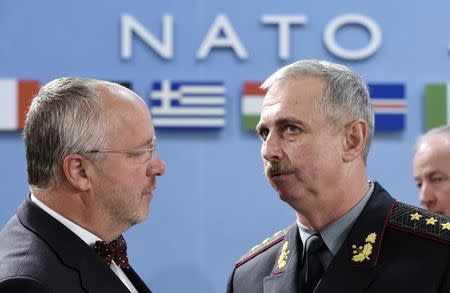Lithuania says Russian military activity stoking tension in Baltics

By Jonathan Saul LONDON (Reuters) - Russia's deployment of troops close to Lithuania and its unannounced military exercises in surrounding Baltic areas have heightened tensions in the volatile region, Lithuania's defence minister said. Alarmed by Russia's seizure of Crimea last year and support for pro-Kremlin rebels in eastern Ukraine, the Baltic states of Estonia, Latvia and Lithuania along with Poland are some of Europe's most hawkish countries on relations with Moscow. "Security is not increasing in the Baltic region since Russia has been more involved in Syria. We still see Russian activities on our borders," Lithuanian Defence Minister Juozas Olekas told Reuters on a visit to London. Russia has stepped up its military support for Syrian President Bashar al-Assad. Olekas said Russian President Vladimir Putin's backing for the establishment of an air base in neighbouring Belarus was part of Moscow's efforts to "demonstrate their power". "We cannot exclude that they are trying to test our national reaction and the NATO reaction in such cases," he said. Russian officials did not immediately respond to requests for comment. The three Baltic states and Poland are NATO members. Olekas said Russia's westernmost Kaliningrad region, which borders Poland and Lithuania and is home to Russia's Baltic military fleet, remained a tense area due to over flights by Russian aircraft and naval activity. Lithuanian officials are concerned about a troop build-up in Kaliningrad, which has been the site of military drills by Russian forces in recent years. Olekas said Russia had "from time to time" tried to send more soldiers and equipment via a short land corridor between Kaliningrad and Belarus. He said Russian naval exercises in the Baltic Sea close to Lithuanian waters and the main sea port of Klaipeda had also meant merchant ships had been held up on occasion. "They will still be active in Syria and they will continue to keep the tension in Ukraine and they will continue to be active in the Baltic region," he said. "They are trying to look where the weakness is and increase activities." Memories of Soviet rule just over two decades ago remain fresh among politicians and voters in the region. Since 2014, the United States has kept about 150 troops in each Baltic state, in overlapping rotations. Britain, Germany and Portugal deployed similar detachments. But Baltic calls for permanent NATO troops have fallen on deaf ears. "I hope that, step by step together, we unite our forces and our airforce with NATO," he said. NATO-member Turkey shot down a Russian airforce jet on Nov. 24 which it said was in its airspace, in the first such incident since the Cold War. Russia denied its warplane was in Turkish airspace and has imposed sanctions against Turkey. Olekas said: "It is not the first time they violate the airspace of Turkey. The reaction from Turkey was adequate." NATO allies plan to send patrol aircraft and missiles to strengthen Turkey's defences on its border with Syria, officials said on Tuesday. [L8N13Q45T] (Additional reporting by Andrius Sytas in Vilnius and Alexander Winning in Moscow; Editing by Janet Lawrence)

